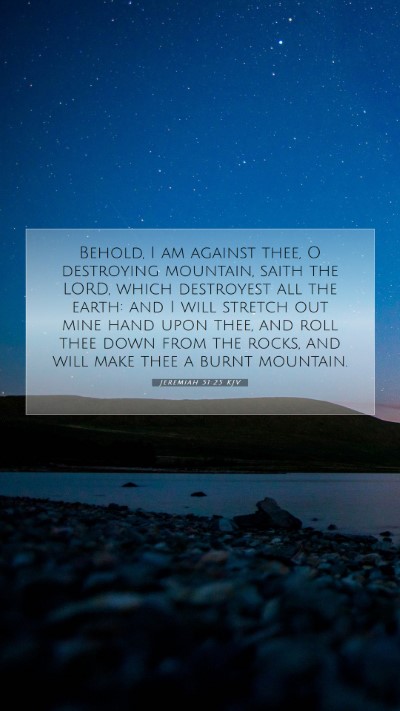Bible Verse Commentary: Jeremiah 51:25
Verse: "Behold, I am against thee, O destroying mountain, saith the Lord, which destroyest all the earth: and I will stretch out mine hand upon thee, and roll thee down from the rocks, and will make thee a burnt mountain."
Introduction
In Jeremiah 51:25, the Lord declares His judgment against Babylon, symbolized as a "destroying mountain." This verse serves as both a warning and a promise of divine retribution, encapsulating the themes of destruction and sovereignty that permeate the prophetic writings of Jeremiah.
Meaning of the Verse
In this profound declaration, we find the intense imagery of a mountain being rolled down, exemplifying the ultimate authority of God over nations and empires. This verse draws on multiple interpretative insights, revealing the depths of its meaning through different lenses.
Commentary Insights
-
Matthew Henry's Commentary:
Matthew Henry emphasizes God's sovereign power, illustrating that Babylon, despite its might, is ultimately subject to God's will. The "destroying mountain" symbolizes the pride and destructive nature of Babylon, which will face inevitable downfall.
-
Albert Barnes' Notes:
Albert Barnes notes that the phrase "stretched out mine hand" indicates God's active engagement in history. He deepens the analysis by relating Babylon's destruction to the broader context of divine justice, where wickedness leads to judgment.
-
Adam Clarke's Commentary:
Adam Clarke elaborates on the metaphor of the mountain, suggesting it represents both physical and spiritual fortifications of Babylon that will be laid waste. His insight points to the totality of God's judgment encompassing both status and location.
Historical Context
To fully grasp the implications of Jeremiah 51:25, it’s essential to consider the historical context in which Jeremiah prophesied. Babylon was a dominant empire of the time, symbolizing wealth, power, and corruption. The Lord’s announcement serves as a counter to Babylon's false sense of security and dominance.
Theological Implications
This verse highlights key theological themes relevant to Bible verse understanding:
-
Divine Sovereignty:
The assertion that God is "against" Babylon underscores the theme of divine sovereignty over nations, illustrating that human power is transient.
-
Judgment and Mercy:
While judgment is pronounced, it also reflects God's mercy in providing warnings prior to destruction—a common motif throughout the prophetic texts.
-
Hope for the Oppressed:
For the Israelites in exile, this verse provides hope in their eventual liberation and the downfall of their oppressors.
Application of the Verse
Jeremiah 51:25 presents several practical applications for modern believers:
-
Understanding Justice:
This verse encourages believers to trust in God's justice, especially when faced with oppression or wrongdoing.
-
Recognizing Pride:
It serves as a reminder of the dangers of pride and arrogance in our lives and societies, urging humility before God.
-
Hope in Trials:
The assurance of divine justice offers comfort to those undergoing hardship, reinforcing the concept that God is aware of our struggles.
Related Cross References
- Isaiah 13:19 - The fall of Babylon prophesied
- Revelation 18:2 - The ultimate destruction of Babylon the Great
- Ezekiel 30:6-7 - God's judgment against Egypt, paralleling themes in Jeremiah
- Nahum 1:4-8 - The destruction of Nineveh as a similar instance of divine judgment
Conclusion
Jeremiah 51:25 encapsulates a powerful declaration of God's judgment against Babylon, symbolizing the ultimate triumph of divine righteousness over human arrogance. Through a combination of scholarly insights, historical context, and theological implications, believers can deepen their understanding of this scripture, appreciating its relevance both in ancient times and today.
Further Study
For those interested in digging deeper into the meanings of Bible verses like Jeremiah 51:25, joining Bible study groups, utilizing Bible study tools, and engaging in online Bible study can provide valuable insights and enhance one’s understanding of Scripture and its significance in our lives.


